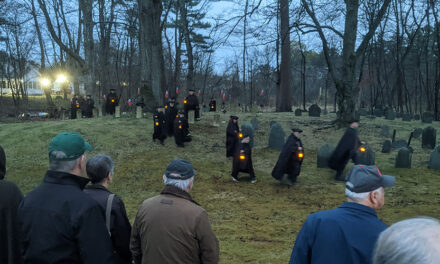Published in the January 18, 2017 edition
By MAUREEN DOHERTY
LYNNFIELD — With a proposed operating budget for Fiscal Year 2018 of $854,520, Library Director Holly Mercer told the selectmen that the town will continue to see a phenomenal return on its investment.
Mercer, who is nearing completion of her first year at the helm of the department since the retirement of Nancy Ryan last spring, has overseen many transitions within the library during her tenure so far, including the hiring of a new Head of Youth Services, Jonathan Nichols, and a tremendous growth in programming and demand for services.
For example between September and December 2016, she stated a total of 115 youth programs were held at the library with an attendance of 3,437. This meant an average of 38 cents was spent per program attendee during this time and the value of these programs was $24,059, which is 10 times the return on investment.
“We get very creative with how we offer our programming,” she said.
How was this investment value determined? Using a “library value calculator” provided by the American Library Association, Mercer was able to determine that based on the library’s FY17 budget of $817,782, the value of services delivered to patrons was $1.9 million, or 132 percent, which is “quite a tremendous return on investment,” she said. Among the data included in these calculations were checkouts, programming and attendance, she said.
With about 1,000 people attending library programs per month while serving 300 patrons per day on average, Mercer’s FY18 budget reflects a total increase of 4.5 percent for all operating expenses and salaries.
New part-time position requested
“In our budget we have requested to add a part-time children’s assistant position 11 hours per week. Our children’s room is staffed Monday through Friday, leaving Saturday as an unstaffed department, so that means if somebody comes in with information requests and if they need assistance, that goes through our information desk. That doesn’t enable us to be as efficient with our resources,” she told the board.
Adding a children’s assistant would enable the library to add children’s programming on Saturdays, which would align with the schedules of many caregivers who cannot attend the weekday programs, she said.
“We’re asking to increase the program budget to $5,000 for the fiscal year. Currently, we are conducting numerous programs with limited funds,” Mercer added.
“We’re also looking to maintain our status to be eligible for state aid funding through the Mass. Board of Library Commissioners (MBLC). Part of those requirements are the municipal expenditure requirements, which maintains that you are open a certain number of hours, an increase in our budget of a certain percent each year, and that we spend 16 percent of our budget each year on materials. All of those are reflected into our budget requests as well,” Mercer explained.
Selectmen Chairman Phil Crawford congratulated Mercer as she nears her first year anniversary as library director and commended her and the trustees for “working hard on the possible future of the library.”
“Your budget is pretty straight-forward. You are not asking for anything large here or new. There are mostly salary increases” within the contractual limits, Crawford said.
Town Administrator Jim Boudreau said that would be correct, with the exception of the additional hours requested for youth services on Saturdays.
Crawford said this youth services position would be “a great program to be running on Saturdays.” He asked Mercer whether the hours needed would be filled by someone on staff or someone new and if an “older youth” could do it.
Mercer said it would be somebody new who had library experience and who held a master’s of library science degree. “There’s specific training that goes along with library programming to align it with educational goals and literacy goals,” she explained.
Selectman Chris Barrett said this type of position may appeal to a school librarian. “I want to congratulate you for your first year. You’ve done a wonderful job working with that current library the way it is; I think it is very restrictive to the space,” he said.
Barrett added that the new programming along with the community partnerships developed with the moms’ group and the schools is a “testament to the work done by the library staff.”
Looking toward the future, with the hope of building a new library at Reedy Meadow, Barrett asked Mercer what programming opportunities would this new space offer to them.
Mercer said a new building with “specialized spaces” would expand programming opportunities for all age groups because multiple programs could be conducted at once.
“It would allow us to have that diversity that the current building limits. For instance, if we have a program in the library now, it can be heard throughout the library … even though people are respectful,” Mercer said.
She envisions a multipurpose library filled with “quiet spaces, inspirational spaces, collaborative spaces, learning spaces – it expands the opportunities of a library space to be used for whatever the community is looking for,” she said.
“You have some really solid, good programs, especially on the children’s side,” Barrett said. “If that’s being used by the moms’ group or the schools, I think it is very restrictive to being utilized if you are not part of that program going on in that section of the library.”
“We average re-orientation of the furniture three times a day,” Mercer said, explaining that the furniture is arranged to hold story time in the morning, then changed for an after-school teens and tweens program, which averages about 25 attendees, and reorganized a third time if another program is planned later in the day. “It is definitely restrictive,” she said.
Barrett also praised Mercer for the return realized on the town’s investment. “It is really impressive what you and your staff are able to do every single day, not only just for the children, but for my age or up to the elderly to offer those services with the restrictive space that we currently have in that library,” he said.
Selectman Dick Dalton joined in to praise Mercer for the value she and the trustees provide to the community. But Dalton tempered his comments by adding that he was also mindful of other concerns as well regarding containing budget costs for the library and all the other departments that come before them due to the fiscal concerns raised by the Town Administrator at the December budget summit.
Mercer’s budget presentation before the board on Jan. 9 was the first formal one made by any town department head to kick off the FY18 budget discussions leading up to the annual Town Meeting on April 24. The selectmen and Finance Committee will make their formal budget recommendations on the entire town operating and capital budgets at public hearings in March. Both boards also make recommendations on specific budgets on the floor of Town Meeting in advance of any votes.
“It’s always a balancing act,” Dalton said, “and I know that from what Jim (Boudreau) said, we’re going to be looking at some substantial costs in town that we can’t afford, whether it’s pensions or health care. So as I look at department (budgets) I’d like to be recommending everything because it all makes sense. But we have to look at this and say are there ways we can avoid a 23 percent increase in new technology?”
“I’m sure you and the trustees firmly believe that it is warranted and it would have benefits for the community, but at some point the overall budget has to reflect a reality. So it’s a concern and we’ll see how the process evolves.”
Dalton also had a question on a note added to the Munis sheet regarding costs associated with a promotion.
“A staff member was promoted to librarian so there’s a 39 percent increase in one account, a 19 percent decrease in another; they’re both longevity, which I would just expect to be within salary,” Dalton said.
“Longevity is part of the union contract, so it depends on the number of years that someone has been employed by the library. So that did change as someone was promoted from a staff member to a department head,” Mercer explained, adding, “It wasn’t a one-for-one exchange. There were a few other things in that line item and I can get you some of the details to help with that, but the main difference was a staff member was promoted to department head.”
Dalton asked if this was a new position and Mercer said no. “A department head had taken employment elsewhere … and the individual was promoted to department head.”
Maintaining accreditation
Robert Calamari, the chairman of the Board of Trustees, said, “We’re very sensitive to Dick Dalton’s comments and I think that there aren’t a lot of moving parts to this budget. The key points are making sure that we satisfy our contractual needs to the staff, and that we satisfy the … requirement that we buy enough materials so that we continue with our accreditation.”
“The one thing that is different this year, and you have all identified it in some of your comments, is there is a degree of vitality and a degree of growth in the attendance numbers that we are seeing almost across the board that we haven’t seen in a very long time,” Calamari said.
Satisfying those needs requires “some prospective dollars” in the FY18 budget, Calamari said, “but it’s really a sign of the momentum that is going on. I think it is really going to serve us well in terms of the discussions around the new building because we are starting to show statistically some of the growth that is very hard to come by in a facility like we have.”
Calamari attributed this growth in large part to “the new leadership that we have that has brought in a sense of new thinking around a lot of the programs that we have.”
“There really is a momentum that has not been evident for many years here and I hope that people think about that as we go through this process. We are sensitive to pitching in to meet the budget needs for the coming year,” he said.
Barrett said he agreed the services requested are “certainly warranted.”
Barrett added that due to “the excitement and discussion around the new library, there has been a whole lot more interest in what the library is providing the town of Lynnfield. Once we capture that audience and they come to this library, I think it’s important that we provide them the services that maintains that clientele.”




